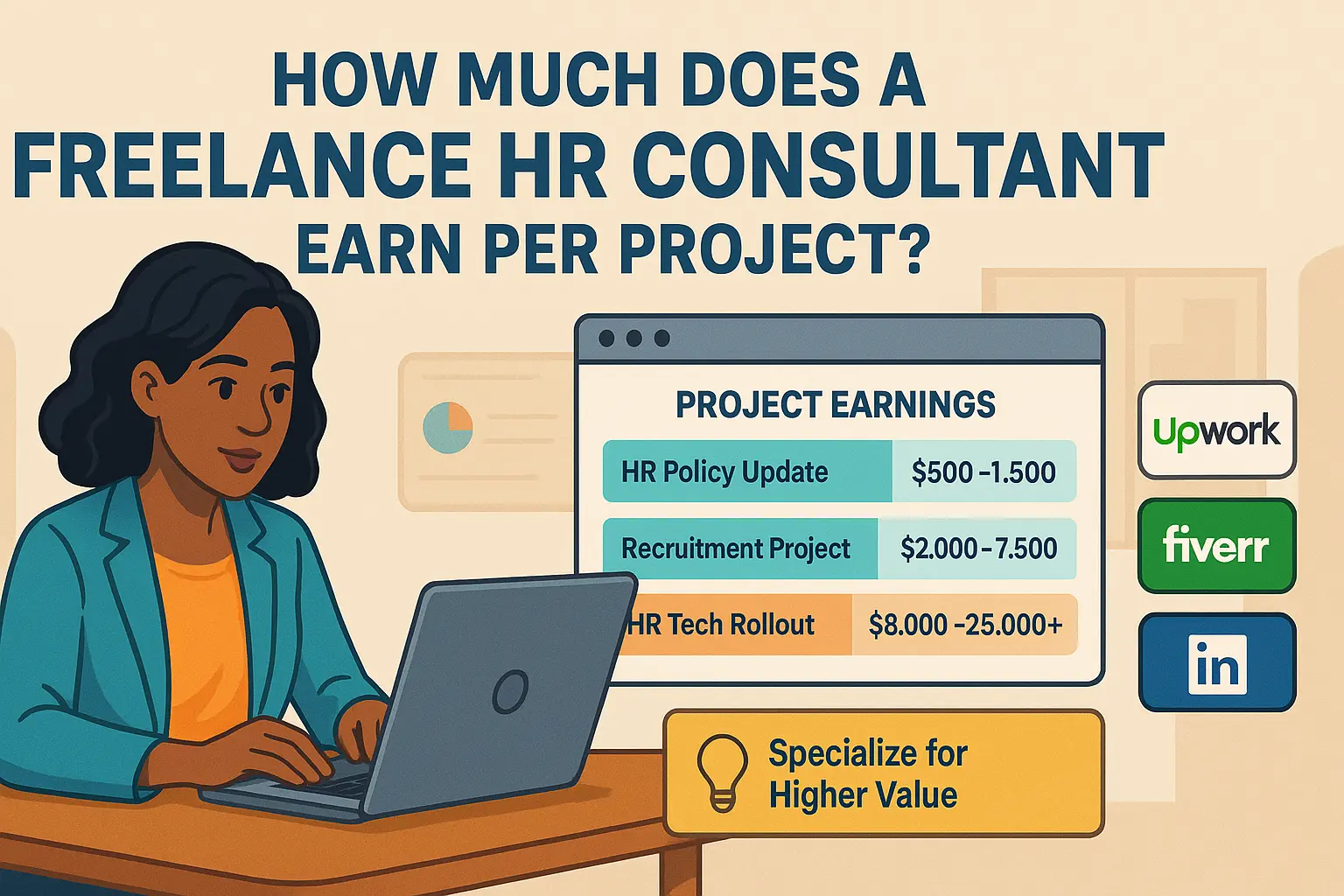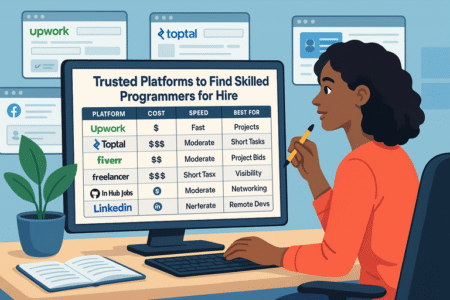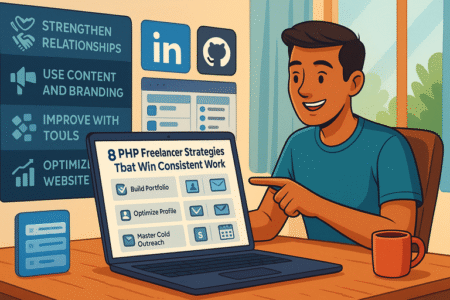Table of Contents
When you’re curious about what a freelance HR consultant really earns per project, it’s not as simple as naming one price.
Let me walk you through the factors and real numbers that shape what HR consultants actually take home.
Key Factors That Shape HR Consultant Project Earnings
Every project is different, and so is the pay. Here’s what truly impacts what you’ll make as a freelance HR consultant per project.
Project Complexity and Scope
- Bigger Projects, Bigger Pay: A short policy review might pay $500, while a full-scale HR transformation could be $8,000–$25,000.
- What Affects Complexity: The number of employees, how many processes you need to overhaul, and whether compliance or legal reviews are needed all add to scope.
Client Type and Industry
- Corporate vs. Startup: Larger firms tend to pay more—think $3,000–$10,000 per engagement—while nonprofits or small startups might offer $800–$2,500.
- Industry Specifics: Heavily regulated fields (healthcare, finance) often pay premium rates for compliance and risk management expertise.
Experience and Reputation
- Seasoned Pros Earn More: If you’re new, expect $50–$100 per hour or $500–$2,500 per project. With 10+ years? Rates of $125–$350 per hour or $5,000–$20,000 per project aren’t rare.
- Niche Specialists: Consultants who focus on diversity, executive hiring, or HR tech implementation often command 20–40% higher fees.
Location and Remote Work
- Local Market Rates: US consultants earn more than their counterparts in Southeast Asia or Eastern Europe. In New York or London, expect project rates at the top end of the scale.
- Remote Flexibility: Virtual HR projects let you serve higher-paying clients globally, not just locally.
Average Freelance HR Consultant Earnings: Real-World Ranges
Let’s cut straight to the numbers, since I know you want actual figures—here’s what most freelance HR consultants report earning per project.
Typical Project Rate Ranges
- Quick Audits or Policy Reviews: $500–$1,500 per project. Example: “Update our employee handbook” (2–3 days work)
- Mid-Size Projects (e.g., Recruiting 5–10 employees): $2,000–$7,500. Example: “Run a full-cycle recruitment for a new team” (2–6 weeks)
- Major HR Overhauls or Tech Implementations: $8,000–$25,000+. Example: “Implement an HRIS like BambooHR for a 100-person company”
Quick Comparison Table
| Project Type | Typical Range | Timeline |
| HR Policy Update | $500–$1,500 | 1–5 days |
| Compliance Audit | $1,200–$4,500 | 1–2 weeks |
| Recruitment Project | $2,000–$7,500 | 2–6 weeks |
| HR Tech Rollout | $8,000–$25,000+ | 1–3 months |
Tip: For multi-phase projects, I suggest negotiating milestone payments (for example, 30% upfront, 40% on delivery, 30% after feedback). This keeps your cash flow healthy.
Pricing Strategies: How Consultants Structure Project Fees
Every successful freelance HR consultant knows the importance of smart pricing. Here’s how most set their fees—and where you can stand out.
Flat-Fee vs. Hourly vs. Retainer
- Flat Fee (Most Popular for Projects): Clear for both sides—ideal for audits, recruitments, or discrete deliverables. Example UI Path: “In Upwork, select ‘Fixed-Price Contract’ during proposal.”
- Hourly Billing: Suits open-ended projects. Many start with $75–$200/hour, adjusting up for rush work or high stakes.
- Retainer Model: Best for ongoing support. I’ve seen monthly retainers at $1,500–$5,000, covering a set number of hours or deliverables.
Value-Based Pricing
- Charge for Results, Not Just Time: If you’re improving retention or slashing turnover costs, you can justify a higher project fee.
- Show ROI: For instance, “Implementing this onboarding plan will likely reduce turnover by 25% in the first year, saving you at least $20,000.”
Tip: In my experience, clients prefer the certainty of flat-fee projects but love when you can link your work to specific outcomes. Always outline what’s included (and not included) in your project scope.
Where Freelance HR Consultants Find Projects and Set Expectations
The platforms and tactics you choose impact your earnings and client quality. Here’s how to land the right projects and set expectations.
Best Platforms for Project-Based HR Consulting
- Upwork & Fiverr: Easy to start, but often price-competitive. Filter for ‘Professional & HR Consulting’ categories.
- Toptal & Catalant: Higher-end projects, vetted clients, and more enterprise HR work.
- LinkedIn ProFinder: Great for building a local or industry-focused reputation.
- Direct Outreach: Reaching out to HR decision-makers via LinkedIn or email is still highly effective.
Setting Client Expectations
- Clear Deliverables: “From the dashboard, click ‘Projects’ > ‘Create a New Project’ and specify your deliverables, milestones, and deadlines.”
- Contracts Matter: Use e-signature tools like DocuSign to formalize scope and payments.
- Communication: Weekly check-ins or progress reports (e.g., via Slack, Trello, or email) keep clients happy and protect you from scope creep.
Pro Tip: If you’re just starting out, use a sample project scope template and a fixed price on your first few jobs. Once you have testimonials, negotiate for larger or ongoing projects.
Common Mistakes That Limit Project Earnings (And How to Avoid Them)
Many freelance HR consultants miss out on higher pay or smoother projects by making avoidable errors. Here’s what to watch for:
Underpricing and Scope Creep
- Don’t Sell Yourself Short: Research competitor rates and don’t underbid just to win a project.
- Set Boundaries: Always specify how many revisions or rounds of edits are included.
Weak Contracts
- No Surprises: Spell out everything—deliverables, payment schedule, ownership of documents.
Example UI Path: “Upload project agreement to HelloSign, request signatures before work begins.”
Skipping Discovery Calls
- Understand the Real Problem: A quick 30-minute video call often uncovers more profitable opportunities than what’s in the initial request.
Ignoring Taxes and Expenses
- Track Everything: Use apps like QuickBooks or FreshBooks to record expenses, set aside 20–30% for taxes, and plan for retirement contributions.
Expert Tips To Maximize Your Freelance HR Consultant Earnings
I want you to get paid what you’re worth. Here are the tactics I (and top earners) use to raise project fees and land better clients.
Specialize for Higher Value
- Niche Down: Focus on in-demand specialties like compliance audits, diversity programs, or HRIS rollouts.
- Showcase Results: Build a portfolio with before/after metrics.
Example: “Reduced time-to-hire by 30% for a 50-person tech startup.”
Build Recurring Revenue
- Upsell Retainers: After a successful project, suggest ongoing HR support—“Let’s keep your onboarding process updated quarterly for $1,200/month.”
- Offer Training Packages: Many companies want HR workshops or manager training as a follow-up service.
Keep Skills and Certifications Current
- Invest in Learning: New HR tech platforms (like Gusto or BambooHR) often pay higher project rates for certified consultants.
- Join HR Networks: Groups like SHRM or HR.com connect you to higher-paying clients and referral partners.
Create Systems for Efficiency
- Standardize Proposals and Reports: Templates save you hours and look more professional.
- Use Automation Tools: Project management (Asana, Trello) and scheduling (Calendly) tools cut down on admin time.
Pro Tip: Anchor Your Rates With Data and Confidence
Clients respect confidence backed by real numbers. Gather rates from peers, platforms, and salary reports (e.g., Glassdoor, Upwork, LinkedIn), then quote your project price with clear rationale.
If a client pushes back, reference industry averages and the outcomes you deliver. This approach not only earns trust, but often wins the deal at your preferred rate.
In summary: A freelance HR consultant typically earns anywhere from $500 for a simple review to $25,000+ for complex overhauls, with real rates shaped by experience, niche, client, and project size. I suggest tracking your wins, setting clear contracts, and never hesitating to charge for the full value you deliver.






